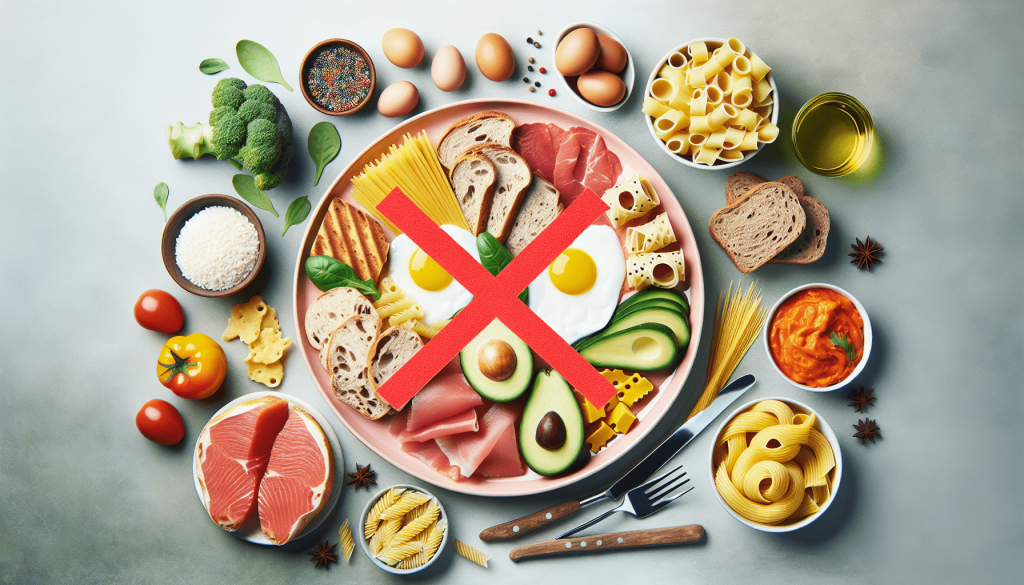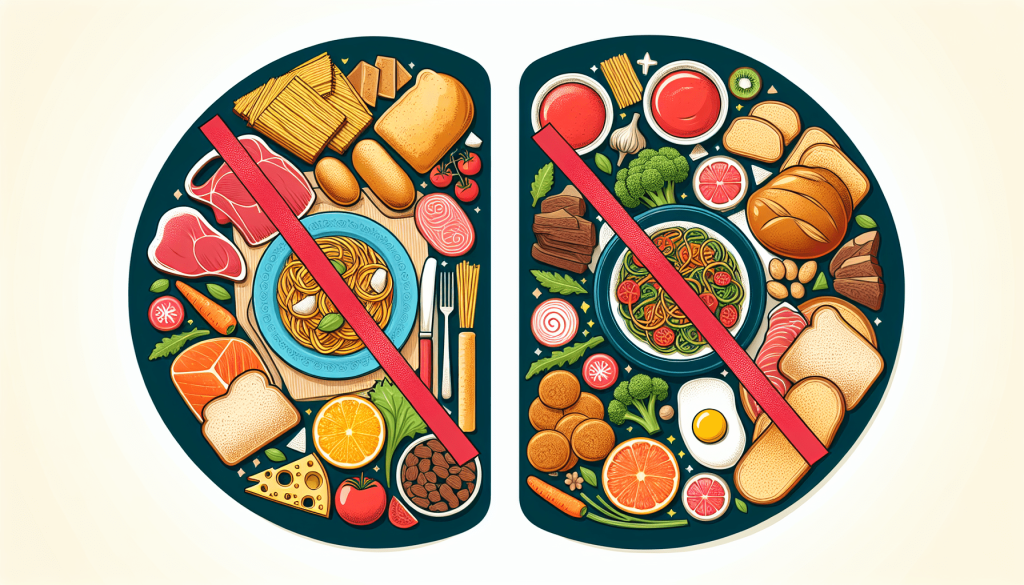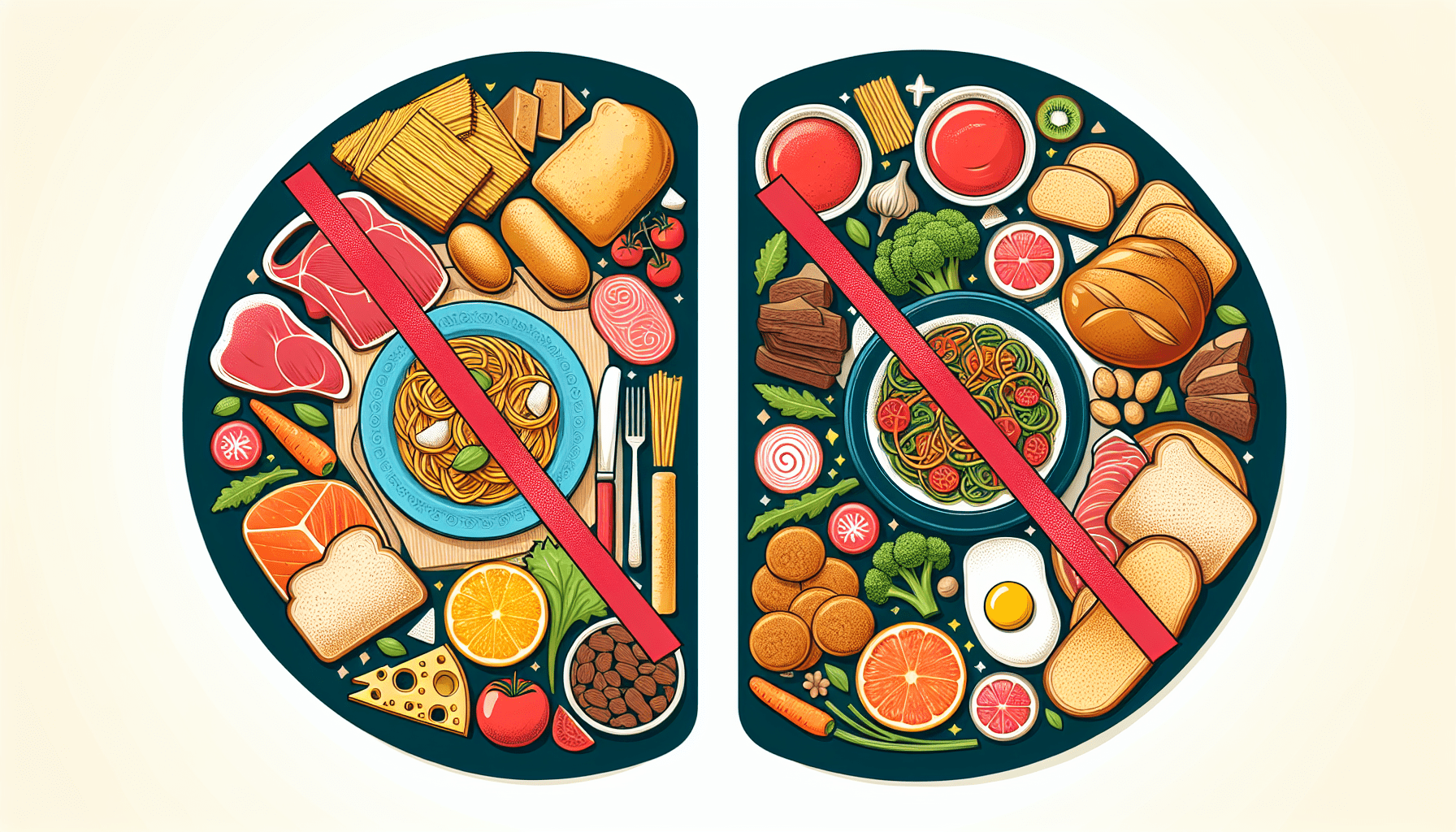Are you on a keto diet or considering starting one? Well, before jumping into this low-carb, high-fat adventure, it’s important to be aware of common mistakes that many beginners make. In this article, we’ll shed light on these pitfalls and provide you with valuable tips on how to steer clear of them. So, grab a cup of tea, sit back, and let us guide you through your keto journey with confidence!
Not Tracking Carbohydrates
Importance of tracking carbs
Tracking carbohydrates is crucial in a keto diet as it allows you to maintain a state of ketosis and effectively reach your weight loss goals. Carbohydrates are the body’s primary source of energy, and when consumed in excess, they can hinder your progress on a keto diet. By monitoring your carb intake, you can ensure that you’re staying within the recommended limits and maximizing fat burning.
How to track carbs
Tracking your carbohydrate intake is relatively simple and can be done through various methods. One popular approach is to use a food tracking app or website that provides nutritional information for different foods and allows you to log your meals. Another method is to keep a food journal where you manually record the carb content of each item you consume. Regardless of the method you choose, consistency is key. Make it a habit to track your carbs diligently to stay on track with your keto diet.
Common mistakes in tracking carbs
While tracking carbohydrates is essential, there are common mistakes that people make when monitoring their carb intake. One mistake is not accounting for hidden carbs, which are often found in processed foods or condiments. These hidden carbs can add up quickly and throw you off your ketosis. Another mistake is underestimating portion sizes. It’s crucial to weigh or measure your food accurately to ensure you’re not unknowingly consuming more carbs than intended. Lastly, overlooking the carb content of alcohol is a common pitfall. Many alcoholic drinks contain high amounts of carbohydrates, which can hinder your progress on a keto diet if not considered.
Neglecting Protein Intake
Importance of protein in a keto diet
Protein plays a crucial role in a keto diet as it helps to preserve lean muscle mass and supports various bodily functions. When you’re in ketosis, your body relies primarily on fat for fuel. However, without an adequate protein intake, your body may start breaking down muscle tissues for energy instead. To avoid this, it’s essential to prioritize protein consumption and ensure you meet your recommended daily protein requirements.
Calculating protein requirements
Calculating your protein requirements can be done based on your body weight and activity level. Generally, it is recommended to consume 0.6 to 0.8 grams of protein per pound of body weight. For those who are more physically active or engage in strength training, a higher protein intake may be necessary. It’s best to consult with a healthcare professional or a registered dietitian to determine your specific protein needs based on your individual circumstances.
Choosing high-quality protein sources
When it comes to selecting protein sources in a keto diet, quality matters. Opt for lean meats, poultry, fish, and seafood as they are low in carbohydrates and rich in essential nutrients. Additionally, eggs, dairy products, and plant-based proteins such as tofu and tempeh are excellent choices. Be mindful of processed meats that may contain added sugars or fillers, as they can derail your progress on a keto diet. Prioritizing high-quality protein sources will ensure that you’re getting the necessary nutrients while staying within your carb limits.

Ignoring Healthy Fats
Role of healthy fats in a keto diet
Healthy fats are a fundamental component of a keto diet as they provide a stable and sustainable source of energy. When you limit your carbohydrate intake, your body enters a state of ketosis, and fats become the primary fuel source. Consuming healthy fats helps to keep you satiated, maintain optimal hormonal balance, and support brain health.
Sources of healthy fats
To ensure you’re incorporating healthy fats into your keto diet, it’s essential to include foods such as avocados, nuts and seeds, coconut oil, olive oil, and fatty fish like salmon and mackerel. These sources provide a good balance of monounsaturated, polyunsaturated, and saturated fats, which are essential for overall health. It’s important to note that while fats are encouraged, it’s still necessary to moderate your intake to maintain a caloric balance and promote weight loss.
Balancing fat intake
While healthy fats are a vital component of a keto diet, it’s crucial to maintain a balance between fats, carbohydrates, and protein. Consuming an excessive amount of fats without considering your overall macronutrient profile can hinder your progress. Focus on consuming an adequate amount of fats to support ketosis and provide energy, but also make sure to prioritize protein and include a variety of nutrient-dense foods to meet your overall nutritional needs.
Excessive Consumption of Hidden Carbs
Understanding hidden carbs
Hidden carbs are often found in processed foods and can sabotage your efforts on a keto diet. They are sneaky carbohydrates that may not be apparent at first glance but can significantly impact your carb intake. Common sources of hidden carbs include sauces, dressings, flavored yogurts, and packaged snacks. By understanding and being mindful of hidden carbs, you can make more informed choices to stay within your carb limits.
Reading food labels
One of the most effective ways to identify hidden carbs is by reading food labels. Pay close attention to the total carbohydrate content, and specifically, the amount of fiber and sugar. Fiber can be subtracted from the total carbohydrate count as it doesn’t significantly impact blood sugar levels. Aim for foods that are low in net carbs, which is the total carbohydrate content minus the fiber content. By reading food labels and making informed decisions, you can avoid unnecessary hidden carbs and maintain ketosis.
Identifying common sources of hidden carbs
Certain food items are notorious for containing hidden carbs. Salad dressings, for example, often contain added sugars and can quickly increase your carbohydrate intake. Additionally, condiments like ketchup and BBQ sauce can be surprisingly high in sugar and carbohydrates. Be cautious of flavored yogurts, energy bars, and protein shakes as they often contain hidden carbs as well. By being vigilant and aware of common sources of hidden carbs, you can make smarter food choices and successfully stay on track with your keto diet.

Not Drinking Enough Water
Importance of hydration in a keto diet
Staying adequately hydrated is essential in any diet, including a keto diet. When following a ketogenic lifestyle, the body excretes more water due to the reduction in glycogen stores. This can lead to dehydration if water intake is not increased. Proper hydration supports bodily functions, aids digestion, and helps control hunger, making it crucial to prioritize water consumption on a keto diet.
Recommended water intake
The recommended water intake can vary depending on factors such as body size, activity level, and climate. As a general rule of thumb, aim to drink at least eight glasses (approximately 64 ounces) of water per day. However, individual needs may vary, so it’s important to listen to your body and increase your intake if you feel thirsty or notice signs of dehydration, such as dry mouth or dark urine. Additionally, be mindful of caffeine and alcohol intake as they can contribute to dehydration and may require additional water consumption.
Tips for staying hydrated
To ensure you’re getting enough water, incorporate these tips into your daily routine:
- Carry a reusable water bottle with you to encourage regular sips throughout the day.
- Set reminders or use smartphone apps to prompt you to drink water regularly.
- Infuse your water with fruits or herbs to enhance the flavor and make it more enjoyable.
- Include hydrating foods in your diet, such as cucumbers, watermelon, and leafy greens.
- Limit your intake of dehydrating beverages, such as sugary drinks and caffeinated beverages.
By prioritizing hydration and implementing these tips, you can support your overall health and optimize your keto diet results.
Overlooking Electrolytes
Electrolyte imbalance on keto
When following a keto diet, there is a risk of electrolyte imbalances due to the body’s increased excretion of fluids and minerals. Electrolytes, such as sodium, potassium, and magnesium, play crucial roles in maintaining proper hydration, nerve function, and muscle contractions. Ignoring electrolytes can lead to symptoms such as fatigue, muscle cramps, and even heart palpitations. It’s important to understand the significance of electrolytes and prioritize their consumption in a keto diet.
Importance of sodium, potassium, and magnesium
Sodium, potassium, and magnesium are particularly important electrolytes to focus on when following a keto diet. Sodium helps to maintain fluid balance, while potassium supports proper muscle and nerve function. Magnesium is needed for energy production and muscle relaxation. It’s essential to ensure an adequate intake of these electrolytes as they can become depleted on a low-carb, high-fat diet.
Sources of electrolytes
To replenish electrolytes, consider incorporating the following foods into your keto diet:
- Sodium: Add a pinch of sea salt to your meals, consume bone broth, or enjoy salty foods such as olives or pickles.
- Potassium: Include foods like avocados, spinach, mushrooms, and salmon in your diet.
- Magnesium: Consume foods like almonds, spinach, chia seeds, and dark chocolate.
You can also consider electrolyte supplements, especially if you’re experiencing symptoms of electrolyte imbalance. However, it’s important to consult with a healthcare professional before adding any supplements to your diet.
Skipping Vegetables
Benefits of including vegetables in a keto diet
Including vegetables in a keto diet is essential as they provide essential vitamins, minerals, and fiber. While a keto diet primarily focuses on limiting carbohydrates, it’s important not to neglect nutrient-dense vegetables that can support overall health. Vegetables are low in net carbs and high in fiber, making them a valuable addition to your meals.
Low-carb vegetable options
Consider incorporating the following low-carb vegetables into your keto diet:
- Leafy greens: Spinach, kale, lettuce, and Swiss chard are packed with essential nutrients and can be enjoyed raw or cooked.
- Cruciferous vegetables: Broccoli, cauliflower, Brussels sprouts, and cabbage are excellent options as they are low in carbs and high in fiber.
- Bell peppers: Whether red, green, or yellow, bell peppers are versatile and provide a good amount of antioxidants.
- Zucchini: This versatile vegetable can be spiralized into “noodles” or enjoyed in various dishes while remaining low in carbs.
- Asparagus: Asparagus is not only low in carbs but also a great source of vitamins and minerals.
By including a variety of low-carb vegetables in your meals, you can ensure you’re getting the necessary nutrients while maintaining ketosis.
Ways to incorporate vegetables into meals
Incorporating vegetables into your meals can be enjoyable and flavorful. Consider these ideas:
- Create a colorful salad with leafy greens, cherry tomatoes, and cucumber, topped with a protein source such as grilled chicken or salmon.
- Roast a medley of vegetables, such as cauliflower, broccoli, and Brussels sprouts, in olive oil and seasonings for a delicious side dish.
- Sauté zucchini and bell peppers as a base for stir-fries or as a side dish.
- Make cauliflower rice as a low-carb alternative to traditional rice.
- Blend leafy greens into smoothies with berries and keto-friendly protein powder.
These are just a few examples of how you can incorporate vegetables into your keto meals. Get creative and experiment with new recipes to keep things interesting and nutritious.
Ignoring Nutrient Density
Importance of nutrient-dense foods
A key aspect of any healthy diet, including a keto diet, is prioritizing nutrient-dense foods. Nutrient-dense foods provide a wide range of vitamins, minerals, and antioxidants that support optimal health. By focusing on nutrient-dense options, you can ensure that your body receives the necessary nutrients while avoiding deficiencies.
Choosing foods with vitamins and minerals
When selecting foods for your keto diet, opt for those that are rich in vitamins and minerals. Incorporate a variety of colorful vegetables, such as leafy greens, peppers, and cruciferous vegetables, to provide a range of nutrients. Include proteins like lean meats, poultry, and fish to meet your protein needs while also benefiting from essential vitamins and minerals. Healthy fats like avocados, nuts, and seeds also offer valuable nutrients, including vitamin E and omega-3 fatty acids. By choosing foods that are rich in nutrients, you’ll support your overall health and well-being while following a keto diet.
Avoiding processed and low-nutrient foods
To ensure you’re maximizing nutrient intake on a keto diet, it’s important to avoid processed and low-nutrient foods. Processed foods are typically high in added sugars, unhealthy fats, and preservatives while lacking in essential nutrients. Instead, choose whole foods and minimize your consumption of packaged snacks, sugary beverages, and highly processed meats. By prioritizing nutrient-dense options and avoiding processed foods, you’ll provide your body with the necessary fuel it needs to thrive on a keto diet.
Lack of Meal Planning
Importance of meal planning in a keto diet
Meal planning is a crucial aspect of successfully following a keto diet. When you plan your meals in advance, you have greater control over your nutritional intake, which can help you stay within your carb limits and achieve your desired goals. Meal planning also saves time, reduces stress, and ensures that you have keto-friendly options readily available.
Benefits of prepping meals
Prepping your meals in advance can offer numerous benefits on a keto diet. By dedicating a specific time to plan and prepare your meals, you eliminate decision fatigue and the temptation to reach for non-keto options when hunger strikes. Prepping meals also helps you control portion sizes and ensures that you’re consuming a balanced mix of macronutrients. Additionally, meal prepping saves you valuable time during the week and eliminates the need for last-minute, less healthy choices.
Tips for effective meal planning
When it comes to effective meal planning on a keto diet, consider these tips:
- Schedule a designated day and time each week for meal planning and preparation.
- Create a list of keto-friendly recipes and build your weekly meal plan around them.
- Make a shopping list based on your planned meals and stick to it when grocery shopping.
- Batch cook and portion meals in advance to save time and maintain portion control.
- Prepare keto-friendly snacks and have them readily available for times when hunger strikes.
By implementing these meal planning tips, you’ll set yourself up for success on a keto diet and make it easier to stay on track with your goals.
Not Listening to Your Body
Recognizing hunger and fullness cues
Listening to your body’s hunger and fullness cues is essential for maintaining a healthy relationship with food and optimizing your keto diet. Paying attention to these cues can help you avoid overeating or undereating, and ensure that you’re fueling your body appropriately.
Adjusting your keto diet according to your body
Each person’s body is unique and may respond differently to a keto diet. It’s important to listen to your body and make necessary adjustments to your macros, calorie intake, or overall dietary approach. If you’re experiencing prolonged fatigue, difficulty with weight loss, or other issues, consider consulting with a healthcare professional or a registered dietitian to tailor your keto diet to your specific needs.
Importance of self-care and rest
Taking care of yourself and prioritizing rest is crucial on any diet, including a keto diet. Restorative sleep, stress management, and self-care practices contribute to overall well-being and can influence the success of your keto journey. Be mindful of your sleep patterns and ensure you’re getting adequate rest. Implement stress management techniques such as meditation, exercise, or hobbies to support your overall health. Remember, a healthy keto diet is not just about what you eat but also about nurturing your body and mind.
In conclusion, avoiding common keto mistakes is essential for successfully following a keto diet. By tracking carbohydrates, prioritizing protein intake, incorporating healthy fats, being mindful of hidden carbs, staying hydrated, replenishing electrolytes, including vegetables, prioritizing nutrient-dense foods, meal planning, and listening to your body, you can optimize your keto diet and achieve your desired health and weight loss goals. Remember, it’s important to approach your keto diet in a balanced and sustainable manner to ensure long-term success.
